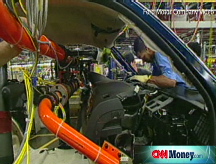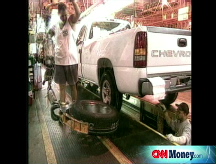Detroit bailout: 7 key questions
As Congress takes a look at whether to help the struggling U.S. automakers, here is what you need to know about what's at stake for the Big Three.
NEW YORK (CNNMoney.com) -- Congress is set to begin a heated debate on whether Detroit's Big Three automakers -- General Motors, Ford Motor and Chrysler LLC -- will be next in line for a federal bailout.
Democratic leaders in Congress are in favor of some kind of help, as is President-elect Obama. But the Bush administration has balked on proposals to let the automakers tap the $700 billion Wall Street bailout approved in October.
Many leading Congressional Republicans have suggested that a better option is bankruptcy, enabling the Big Three to restructure and ultimately emerge as leaner and viable businesses.
How this debate plays out could determine whether this important industry survives -- and in what form. Here are some quick answers to seven key questions about the crisis.
What do the automakers want?
The automakers are asking for about $25 billion in loans to help them survive until 2010. Advocates for a bailout argue that if the Big Three can hang on until then, they'll be in position to be competitive long term.
That's because billions of dollars in annual savings won in the 2007 labor agreement with the United Auto Workers union kick in that year, including shifting the responsibility for retirees' health care costs to union-controlled trust funds.
What's more, it's likely that car sales will pick up again by 2010 and that plant closings between now and then will bring the Big Three's capacity in line with this demand.
How many jobs are at stake?
GM (GM, Fortune 500) has about 120,000 U.S. employees. Ford (F, Fortune 500) has about 80,000 and closely-held Chrysler LLC has about 66,000.
In addition, the three automakers have about 14,000 U.S. dealerships that between them employ another 740,000 workers.
The suppliers used by the Big Three also employ an estimated 610,000 people.
Add that up and you have more than 1.6 million jobs tied to the auto industry.
What happens if there's no bailout?
GM risks running out of money later this year or early in 2009 without a bailout.
GM burned through $6.9 billion during the third quarter, leaving it with only $16 billion on hand as of Sept. 30. But it needs $11 billion to $14 billion to continue normal operations.
Ford and Chrysler have more cash relative to their needs, mostly from money they borrowed prior to the current credit crunch.
But each of those automakers could also run out of cash during 2009 without federal assistance.
What happens if an automaker goes bankrupt?
There are two types of corporate bankruptcy under U.S. law.
Chapter 11 allows a company to continue to operate as it sheds debts and contracts it can not afford.
In Chapter 7 bankruptcy, the company goes out of business fairly rapidly as its assets are sold off to try to satisfy its creditors.
What are advantages of an automaker going into bankruptcy?
Some argue that bankruptcy judges will be able to force the automakers to shed brands and dealerships as well as get the Big Three out of labor contracts they can not afford.
Other U.S. industries, such as steel companies and airlines, have used bankruptcy in the past to return to profitability without putting federal dollars at risk.
What are the arguments against a Chapter 11 bankruptcy?
Given the current credit crunch, many experts question whether automakers would be able to get necessary financing from lenders to help them during the reorganization process.
There are also doubts whether consumers would buy new vehicles from a bankrupt automaker due to concerns over their resale value and warranty. In effect, an automaker that files for Chapter 11 could eventually wind up going out of business anyway.
What are some of the other broader economic impacts if an automaker goes out of business?
Nearly 2 million Americans get their health insurance directly from one of the Big Three automakers. Most of them would lose that coverage if their company goes out of business. A failure of one of the Big Three could also cause a string of bankruptcies among suppliers.
And beyond the job losses at the automakers, dealerships and suppliers, media companies that generate a lot of revenue from auto advertising, as well as retailers in towns where plants are located, could also have to cut many jobs. The Center for Automotive Research, a Michigan think tank that supports the bailout, estimates that between 1.4 million and 1.7 million jobs indirectly tied to the Big Three would be lost in the first year following widespread auto failures. ![]()
Detroit: How it got here, how to fix it
GM failure: The shockwave
Why GM can't survive bankruptcy
GM: Almost out of cash
Should you buy from a bankrupt automaker?
Detroit pushes Capitol Hill for bailout
Millions of jobs at stake in automakers' woes
Auto sales worst in 25 years
The Big Three bailout debate



